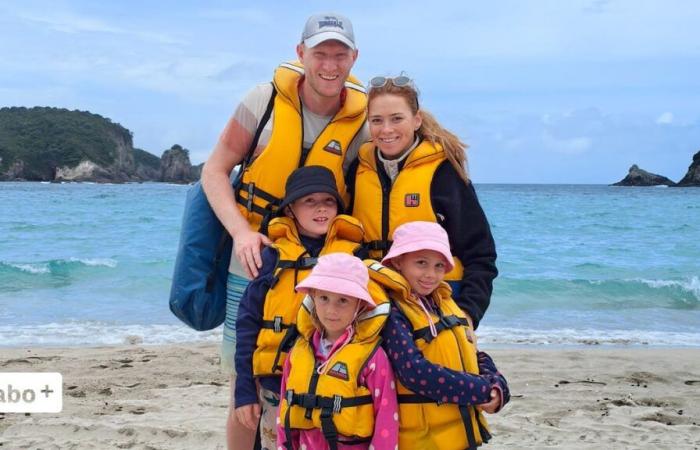“Outsiders might think we are naive”: A Gams family emigrates to New Zealand in search of more space
A joke becomes reality: the Bätjer family has been living in New Zealand for a year. Here they talk about how they found their feet in the land of the Kiwis and what their three children miss most about Switzerland – and a New Zealander weighs in.
The Bätjer emigrant family stands on a beach in New Zealand. The children have traveling in their blood.
Image: zvg
The idea comes out of nowhere. One day, after a bad day at work, Chris Bätjer says to his wife: “Come on, let’s just leave everything behind and go to New Zealand.” He thinks nothing of it, thinks it’s a joke.
But his wife listens up. She hardly knows anything about this country and begins to research. This happened in 2014, when Abish Bätjer was pregnant. “And then I worked with Chris on this idea for almost ten years,” she says and grins. Chris Bätjer says: “She got more and more involved and our plans became more and more concrete.”
Now the five-member family from Gams, which will be seen on the SRF program “Up and Away” on Saturday evening, has been on the other side of the globe for a year. They have only been living in a house again for six months. When they left, the Bätjers had only booked an Airbnb for six days. During this time they organized a motorhome in which they traveled through New Zealand with their three children for months. “We first had to get to know the country and find a place that we liked.”
The Bätjers lived in the motorhome for six months: on Saturday, November 16th, you can see them on the show “Up and Away” with Mona Vetsch.
Image: SRF
A bleating surprise awaits in the new home
After half a year of being a nomad, the Bätjers find this spot in Christchurch. There they rent a house with four hectares of land. Abish Bätjer really wants animals and is buying two pregnant sheep now that the family is settling down again.
When they move in, they notice that there are already 30 sheep on the property. The couple suspects: “Maybe this is just part of a house in the country.” Meanwhile, another 17 lambs have been added.
Harley Williams can answer the question of whether sheep in New Zealand are automatically part of a house in the country. He grew up in New Zealand and came to Gossau 15 years ago for his Swiss girlfriend – and now wife. When the story is told to him, he has to laugh: “I’ve never heard anything like that.” It is by no means the case that sheep are included as standard. His theory: “I think the landlord just wanted to get rid of his animals and saw an opportunity.”
He traveled to pursue his true love
42-year-old Harley Williams met a Swiss woman in Auckland, New Zealand, in 2008. They fell in love immediately. When the brewery where Williams worked was hit by the global recession, Williams seized the opportunity to travel to pursue his Swiss love. He had to learn the German language from scratch and also have to restart his career. The two are now married, have three children and live in Gossau. (viv)
Like Williams, Abish Bätjer originally immigrated to Switzerland. As a child she moved with her parents from Belgium to Wildhaus. But her family wasn’t exactly thrilled about her next emigration project. The 31-year-old says: “From the outside, many people probably think that we are naive to get involved in this uncertainty with three children.” Such feedback also came from her relatives. The full-time mother and trained beautician says jokingly: “I don’t think my father has ever forgiven me for moving to the other end of the world.”
Abish and her eldest daughter care for a lamb born in the New Zealand winter.
Image: zvg
More space for the spontaneous chamois
Chris Bätjer, a trained polymechanic who now works in quality management, says: “We were very happy in beautiful Gams – but we missed the freedom and space.” In Christchurch, the Bätjers feel like they are among their own kind because they are spontaneous people who take things as they come. In addition, the place name says it all: Abish and Chris Bätjer were surprised at how large the Christian offerings are in the area. As members of The Church of Jesus Christ of Latter-day Saints, you could even choose from two churches in your community – an important step for you to feel at home.
The New Zealander Harley Williams has lived in Gossau since 2009.
Image: zvg
Naturalized New Zealander Harley Williams adds: “It is a strength of New Zealand that all possible religions live peacefully together without one dominating the other. Monotheism in Switzerland was initially very foreign to me.”
When the word spontaneity comes up, Williams smiles and says: “We have to be spontaneous, the weather forces us to.” The two Pacific islands are exposed to extreme weather conditions, with rapid changes. “In Switzerland you make an appointment six months in advance if you want to have a barbecue with friends. But in New Zealand you have to leave everything behind when it’s grilling weather.”
For the Gossau Kiwi, the place is also a strong homesick factor. He loves hiking in Switzerland. But: “There’s a SAC hut waiting on every corner here.” In New Zealand he never goes hiking without firewood, a rain jacket, rope and emergency equipment. “You can wander there for days through the wilderness, far from civilization.” This is also reflected in another aspect: “When you have a conversation with a New Zealander, you usually keep a distance of one to two meters. The Swiss are much closer to you.” Williams had to get used to that.
In everyday life in New Zealand for six months
The emigrants Abish and Chris Bätjer.
Image: zvg
Bätjers also found circumstances in New Zealand that took some getting used to. Abish Bätjer had to swallow when she stood in the supermarket for the first time: “Food prices are very high and wages are low. “There is also less choice of products than in Switzerland, and some of them are very artificial.” The children would especially miss Volg and Migros. This has already led to desperation in strange supermarkets.
But the family only had six months to settle into everyday life in New Zealand. They are still getting used to it. In addition to the amount of space that the young family values so much, they already like the New Zealand style. 37-year-old Chris Bätjer says: “In New Zealand you don’t see a lot of things so closely, which we really like.” The focus is more on the human, less on the factual. A widespread motto is: “It is what it is.”
Williams adds: “If you’re a stranger in New Zealand, everyone wants to hear your story.” The people are very open and humorous, and the country is culturally extremely diverse. “If you live so remote that you are regularly forgotten on the world maps, then you rely on people coming by.”
Williams experienced things differently in Switzerland, where he didn’t feel valued as a foreigner. Williams explains it like this: “Switzerland has the opposite problem: everywhere you reach borders with larger countries. You have to defend your nationality better and are forced to be a little more reserved.”
A little piece of home: A New Zealand-centric world map hangs in Williams’ office.
Image: zvg
The fondue is available despite the high temperatures
Williams has fully settled in in Switzerland. His parents still have to send him something from New Zealand on a regular basis: New Zealand Marmite, a seasoning paste. And the Bätjer family, who are still arriving, already know which Swiss tradition is non-negotiable for them: “At Christmas there is fondue.” They stubbornly eat this on Christmas Eve – on the beach and at 30 degrees.
“Up and Away” runs on Saturday evening at 8:10 p.m. on SRF 1.
More articles from these communities






